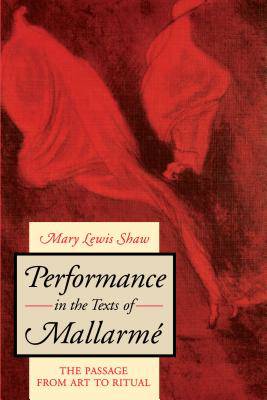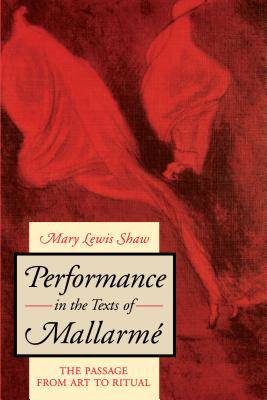
- Afhalen na 1 uur in een winkel met voorraad
- Gratis thuislevering in België vanaf € 30
- Ruim aanbod met 7 miljoen producten
- Afhalen na 1 uur in een winkel met voorraad
- Gratis thuislevering in België vanaf € 30
- Ruim aanbod met 7 miljoen producten
Performance in the Texts of Mallarmé
The Passage from Art to Ritual
Mary Lewis ShawOmschrijving
Performance in the Texts of Mallarmé offers a new theory of performance in the poetic and critical texts of Stephane Mallarmé, a theory challenging the prevailing interpretation of his work as epitomizing literary purism and art for art's sake.
Following an analytical presentation of the concepts of ritual and performance generally applied, Mary Shaw shows that Mallarmé perceived music, dance, and theater as ideal languages of the body and therefore as ideal forms of ritual through which to supplement and celebrate poetic texts. She focuses on previously unexplored references to supplementary, extratextual performances in four of Mallarmé's major poetic texts--Herodiade, L'après-midi d'un faune, Igitur, and Un coup de des--revealing the consistent formal expression of his original conception of literature's relationship to the performing arts.
Shaw then discusses Mallarmé's monumental project, Le Livre, a metaphysical book designed to be performed in a series of ritual celebrations. She analyzes and describes the intrinsic structure and contents of this unfinished work as the fullest realization of the text-performance relationship elaborated throughout Mallarmé's corpus. Shaw offers Le Livre as a prototype of avant-garde performance, drawing important parallels between Mallarmé's literary experimentation and crucial developments in twentieth-century arts.
Specificaties
Betrokkenen
- Auteur(s):
- Uitgeverij:
Inhoud
- Aantal bladzijden:
- 288
- Taal:
- Engels
Eigenschappen
- Productcode (EAN):
- 9780271026695
- Verschijningsdatum:
- 15/09/1992
- Uitvoering:
- Paperback
- Formaat:
- Trade paperback (VS)
- Afmetingen:
- 152 mm x 229 mm
- Gewicht:
- 430 g

Alleen bij Standaard Boekhandel
Beoordelingen
We publiceren alleen reviews die voldoen aan de voorwaarden voor reviews. Bekijk onze voorwaarden voor reviews.











